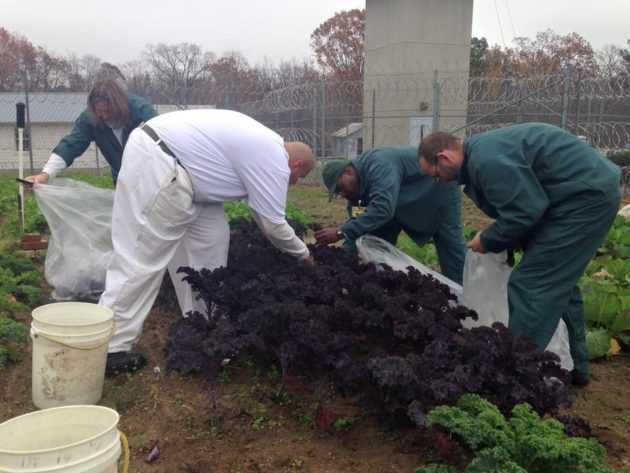Last Updated on January 4, 2017 2:22 pm
RALEIGH — In 2016 the North Carolina Department of Public Safety prison system saw a three-fold increase in the number of facilities growing and donating produce to local food banks, community pantries and social service organizations. The 20 facilities more than doubled the amount of fruits and vegetables sent to help fight hunger and improve health in their communities.
In its second year of the “Combating Hunger” project with Harvest Now, a national non-profit that works with several state prison systems, 20 North Carolina state facilities provided about 36,313 pounds of fresh produce to local food banks and anti-hunger organizations.
“Combating Hunger is a win-win situation for the community and our state,” said David Guice, commissioner of Adult Correction and Juvenile Justice. “This is a great collaboration between the local community and the prison system. It provides inmates training for post-release job opportunities and allows inmates to give back to local communities.”
In the first growing season (2015), inmates grew and donated 16,250 pounds of fresh produce. This year, the following prisons participated and assisted their communities with much-needed fruits and vegetables including squash, winter cabbage, collards, onions, tomatoes, watermelon, bell peppers and cucumbers:
- Brown Creek Correctional Institution, Polkton; Odom CI, Jackson; Burke Confinement in Response to Violation (CRV) center, Morganton; Carteret Correctional Center, Newport; Pamlico CC, Bayboro; New Hanover CC, Wilmington; Rutherford CC, Spindale; Robeson CRV, Lumberton; Hoke CC, Raeford; Avery Mitchell CI, Spruce Pine; Swannanoa Correctional Center for Women, Black Mountain; Southern CI, Troy; Lumberton CI, Lumberton; Pender CC, Burgaw; Johnston CI, Smithfield; North Carolina CIW, Raleigh; Caldwell CC, Lenoir; Lincoln CC, Lincolnton; Davidson CC, Lexington; and Forsyth CC, Winston-Salem.

Fresh produce is one of the most expensive and scarcest commodities in North Carolina food banks, and Harvest Now sought the NCDPS prison system’s help in providing reliable, local sources of donated fresh produce. Harvest Now donates $7,000 worth of seeds to the prisons and CRV centers, and the facilities work with local community colleges or agricultural extension offices for expertise and advice on planting and tending their gardens.
More information about Harvest Now is available at www.Harvest-Now.net.
















